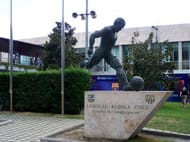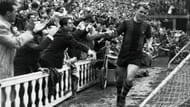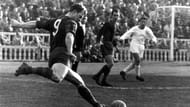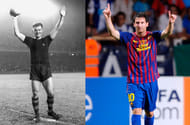22nd March, 2015 – a night when the Catalan locals will be treated to a true footballing spectacle. It will be a night when two of the most expensive squads in Spanish football history will go head-to-head in Barcelona.
A night when a new chapter will presumably be added to the Messi-Ronaldo saga, as new superstars like Luis Suarez and James Rodriguez will also look to leave a lasting impression on a rivalry that goes back more than 100 years.
And yet, the Catalan locals won’t be resting all the burden of their expectations on the cast that will be performing at the Nou Camp. Instead, ahead of probably the biggest El Clasico kick-off in recent times, they will visit the Les Corts cemetery to conduct their annual rituals. They will all gather around a famous family graveyard plot with their customary bouquets, red-yellow Catalan ribbons and heartfelt prayers, hoping for a miracle.
It will be almost 64 years since he last played for them, and it will be more than 13 years since he passed, but as he rests in the grave, they still believe he can deliver on the biggest night.
They still expect nothing but victory from Laszlo Kubala.
"I am a man with no homeland because my country is under Communism."
Kubala came from a humble Hungarian upbringing, and his childhood had nothing to show for it apart from the scars of Communism. Yet, football was a source of unadulterated joy in his youth and a way of freedom in his adulthood. He faked his date of birth to register himself in the local football team as the game remained his way out from the depressing political state of the nation.
His personal bouts with the Communist state later also saw him being separated from his family as he wandered around Europe in search of football and most importantly, a home.
When he finally decided to join Barcelona in 1950 with an impending FIFA ban, having been called a Hungarian ‘deserter,’ he cut all ties with his home nation. It was a case of the Catalans adopting him as their light of hope on the football field in the post civil war era against ‘Franco’s team’, an understanding that soon became a relationship built on love and mutual respect.
He was Catalonia’s answer to the on-field tantrums thrown by the authority, a player that brought those glittering trophies and memories that marked the most prolific decade in Barcelona’s footballing history.
No wonder he was voted as the greatest Barcelona player of the century by the Catalans – the undisputed fans’ player of the club. Even Messi in the current era, with all his personal awards and team accolades, will never be able to claim that honour.
"No one had seen anyone curl a ball over the wall before. Kubala did it.”
Back in the early 1950s, when most of the Spanish clubs were keen to import tactical know-how from the British isles, Kubala was clearly ahead of his times. He emphasized the importance of getting pre-match opposition scouting reports done, of tactical preparation, of innovation in set-piece methods and more. He expected Barcelona to evolve their training methods, and wanted the team to grow along with him.
And the plans came to fruition sooner than anyone expected at the club.
The crowds got to witness football of their dreams. Suddenly, set-pieces weren’t just a routine stoppage of play but a goal-scoring opportunity, while shooting from the penalty spot became impossible to miss. Spanish football had changed for good and Kubala was at the core of the revolution on the pitch.
While we’re spoilt by the routine free-kick marvels of Andrea Pirlo, Cristiano Ronaldo, David Beckham and Lionel Messi, it is hard to imagine that nobody had seen a ball curled over the wall, into the top corner from 30 yards before Kubala did it. Nobody saw him missing a penalty either.
All of that was down to his technical prowess and above all, his ability to grasp as much as possible, being a keen student of the game.
"He was our Messi”

In fact, if the 5-time La Liga winner and Barcelona legend Josep Seguer is to be believed, Kubala was even greater than Messi. The Hungarian, with his imposing physique and unrivalled bursts of energy on the pitch, could have played in any position on the pitch and still made an impact on the end result. Kubala was a true two-footed forward, but that did not stop him from being equally efficient as a No. 6, No. 8 or even a No. 10 in the side.
While in the modern age coaches have generally attempted to build a team around the likes of Messi and Ronaldinho, Kubala believed in filling the crucial gaps on the pitch in order to get the right results for his team.
And talking about results, there wasn’t a single trophy that he did not add to the cabinet in his 10 years at the club. In his second season at the club, he won every honour that was up for grabs. That was the most successful season in the club’s history and is remembered as the Cinc Copes (the 5 Cups – League, domestic cup, Copa Duarte, Copa Martini and Rossi and Duward Cup) of Barcelona. They also added Copa Latina – played between the best clubs of France, Italy, Portugal and Spain – in the same season to make it six trophies for the season.
It was a season that also prompted the Catalan fans to come up with one of the most memorable chants of the 50s – "There are six things that shine more than the sun – Barcelona's five cups and the s**t that is Espanol.”
"I remember the report: no apto para el deporte – not fit for sports.”
In October 1952, Kubala was diagnosed with tuberculosis and was forced to retire from the game. The fighter that he was, Kubala did not rest but instead decided to test his endurance by training at high altitudes.
What Barcelona witnessed next was nothing less than a miracle. Kubala, now fully recovered from the disease, made a comeback in February 1953 to pick the out-of-sorts Barcelona side from 4th place to a league and domestic cup double.
The team got their leader back in the side, while the fans discovered his superhuman abilities that would make a permanent mark in Catalan folklore.
Kubala vs Messi – Is a comparison even possible?
It is fair to say that a comparison between two contrasting profiles such as Messi and Kubala could get seriously convoluted, largely because of the two having played the game in completely different eras.
Due to limited number of games in the 1950s, Kubala never played a league season longer than 25 games, a number that is unfair to even be mentioned in the same breath as the 38-game seasons that Messi has been playing during his Barcelona career. The Hungarian could only finish with 256 appearances and 194 goals in his 10 years at the club – still the third highest goals tally at the club. That should be considered as a remarkable achievement.
With 14 major team honours to his name including four league triumphs, five domestic cup wins and three European trophies, Kubala does surpass Messi’s haul of five leagues, three cups and three European honours at the club.
Kubala also remains the first man to have scored seven goals in a La Liga game and the highest scorer in a domestic cup season, and is the who lead Barcelona to a five-trophy season in 1951-52. Add that to the fact that he was the most adored player in Catalan history, and you have a true club legend in Laszlo Kubala – the only foreign player to have adopted Catalonian culture and made it a part of his own.
Messi can go on and add a few more league and European wins and top it with a World Cup and maybe some more Ballon d’Ors too. He may end up being the greatest of them all – ahead of Pele, Maradona, Best and Cruyff. He may end up being wearing the crown of the greatest footballer of all time.
But he will never be the best player Camp Nou ever saw. And that is not his fault.
Quotes courtesy: Fear and Loathing in La Liga: Barcelona vs Real Madrid by Sid Lowe. You can buy your copy here.



